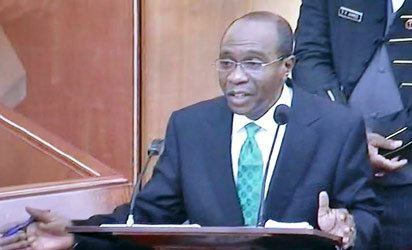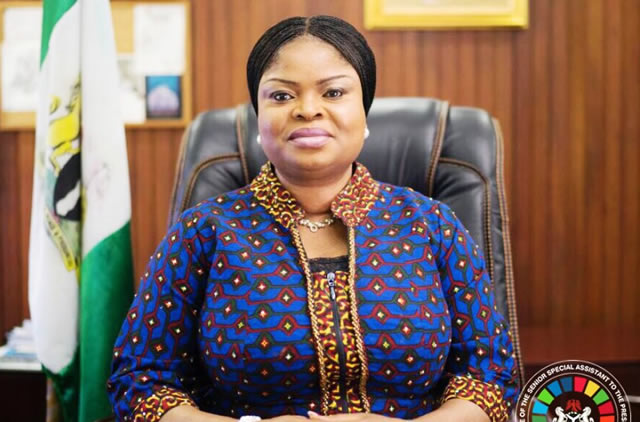
The National Collateral Registry (NCR) office has outlined measures to increase lending by financial institutions to Medium, Small, and Micro Enterprises (MSMEs) to over N2 trillion in 2019. Mr Godwin Emefiele answering questions during his screening by the Senate for Central Bank Governorship in Abuja on Wednesday These include 50 percent increase in utilisation of the NCR by financial institutions, and liaising with supervisory departments of the Central Bank of Nigeria (CBN) to ensure compliance with the Secured Transactions and Movable Assets Act, 2017.Â
Nigeria has about 32 millions MSMEs which employ millions of Nigerians as well as contribute to the nation’s economic growth. But many of them find it difficult to survive or prosper due to lack of access to credit facilities from financial institutions.
 Financial institutions are mostly unwilling to lend to MSMEs because they don’t have properties like land and buildings which can be used as collateral for loans. This is confirmed by a survey conducted by a World Bank/Central bank of Nigeria team which shows that only 31 percent of MSMEs in Nigeria currently have a loan with a bank or a microfinance institution, and that personal savings and business income are the most important sources of capital for financing businesses. At the same time, 82 percent of financial institutions surveyed said that inadequate collateral is the most common challenge in granting loans. Minister of Industry, Trade and Investment, Okechukwu Enelamah Rationale for the NCR To address this challenge and deliver on its mandate on sustainable economic inclusive growth and financial inclusion, the Central Bank of Nigeria (CBN) in collaboration with the International Finance Corporation (IFC) established the National Collateral Registry (NCR).
 The establishment of the NCR follows the success recorded by similar initiatives around the world. According to the IFC, “Collateral registries are breaking down barriers to lending, especially for women and younger entrepreneurs who often do not have credit histories or banking relationships. Colombia’s collateral registry was launched in March 2014. Since then, it has received over 1.3 million registrations. “Also, about one-fourth of these registrations represent credit to micro, small, and medium enterprises—and there is clear potential to increase the numbers. More than 100 financial institutions, including some of the largest banks in the country, are already participating in the registry as lenders.†The IC noted further: “Mexico has implemented an electronic movable-collateral registry—with 97 percent of the registrations supporting loans to small and medium enterprises. In May 2015, a new secured-transactions system came into effect in Costa Rica. In the year that followed, there were about 9,500 new registrations. More than 4,500 small and medium enterprises received loans secured by movable assets.
 The World Bank also noted that in Ghana, the collateral registry has facilitated $1.3 billion in financing for the small-scale business sector since it was established in 2010, and $12 billion in total financing for the business sector using movable assets as collateral. Umaru Dikko Radda NCR Mandate Launched in May 2016, the NCR  is a financial infrastructure that seeks to deepen credit delivery to Micro Small and Medium Enterprises (MSMEs) through enhanced acceptability of movable assets (equipment, machinery, vehicles, tricycle, crops, livestock, account receivables, inventories, jewelries etc.) as collateral for loans by financial institutions. It is a noticed based Registry where security interests in moveable assets are registered after being used as collateral to obtain facilities from financial institutions. It allows lenders to assess their priority interest in potential claims against particular collateral. The objectives of the Secured Transactions & National Collateral Registry (ST/NCR) is to enhance financial inclusion in Nigeria, stimulate responsible lending to MSMEs, facilitate access to credit secured with movable assets, perfect security interests in movable assets, facilitate realisation of security interests in movable assets, and to establish a Collateral registry and provide for its operations. The key deliverable of the Registry is to promote the acceptance of movable asset as collaterals for loans and contribute to economic growth and development of the country. ALSO READ: Credit guaranty scheme underway for DBN institutions Progress report A recent report by the CBN shows that the NCR like similar initiatives around the world is living up to expectations in facilitating lending to MSMEs.
 The report showed that the number of  MSMEs that have used their movable assets to obtain loans from financial institutions through the NCR rose from 100,049 in the first year, 2017, to 154,827 as at December 19, 2018, indicating increase of 54 percent. The report also showed that 22,251 of the MSMEs were female entrepreneurs. Further breakdown showed that 146,777 of the borrowers were individuals, 3,416 were micro businesses, 2,169 were medium  businesses, 1,777 were small businesses and 687 were large businesses. The number of movable assets used by the MSMEs to obtain loans rose to 57,639 as at December 19, from 26,471 in 2017, representing increase of 28,302 or 118 percent Top on the list of the movable assets are: Documents of title / Negotiable Instruments (17105); Motor vehicles (11, 725); Consumer / Household goods (9,029); All assets (6,427); Electronics namely Television, Refrigerator, Projector (3,5740); Other intangibles (2,573); Inventory (2,531); Farm products (1,580); Deposit Accounts (1,141); and Equipment (537).Â
Lending and participation Lending under the NCR rose by 226 percent per cent to N1.62 trillion in 2018 from N497 million in 2017. The upsurge in lending activities, according to the CBN was due to the increase in the number of microfinance banks (MfBs) on the NCR portal as well as increased participation of deposit money banks and non-bank financial institutions. As a result the number of participating financial institutions in the NCR rose to 628 in 2018 from 103 in 2017. The number of participating Deposit Money Banks (DMBs) rose to 21 from three in 2017, microfinance banks rose to 551 from 96, Development finance institution rose to four (4) from one(1), merchant banks rose four from one, finance companies rose to 13 from 2 while non interest bank rose to one from zero in 2017. Analysis of lending by participating banks showed that DMBs led with N1.07 trillion, followed by Non-Bank Financial Institutions with N340.3 billion, Development Finance Institutions with N52 billion, MfBs with N21.6 billion, and Merchant Bank with N400 million. Further analysis showed that lending to individual borrowers rose by 858 percent to N360 billion in 2018 from N34 billion in 2017, while lending to large businesses rose by 371 percent to N1.25 trillion from N265.08 billion. Lending to medium businesses rose by 24 percent to N212 billion in 2018 from N170.5 billion in 2017, while lending to small businesses rose by 51 percent to N19.76 billion in 2018 from N13.1 billion in 2017. ALSO READ: Analysts project MPC to maintain status quo despite inflation concerns Further analysis shows that more financial institutions and members of the public conduct search on the NCR, reflecting increased awareness. According to the CBN report, 16,400 searches have been conducted on the NCR from inception till end of 2018. While financial institutions conducted 12,506 searches, members of the public conducted 3,894 searches. The was enhanced by the movement of the NCR solution to the cloud which enabled the website to be more stable making productive performance by enhancing its accessibility by financial institutions and general public with ease. As a result the NCR did not record any downtime/network interruption in 2018. Plan for 2019 The NCR office has outlined some steps aimed at enhancing public awareness and participation. Among things, the NCR office hopes to increase utilisation by financial institutions by 50 percent as well as partner with the World Bank and National Judicial Institute to organise a specialised 2-3 days Workshop for Judicial Officers on the new secured transactions in movable assets regime in Nigeria. The NCR also plans to: Carry out sensitisation seminars for the legal community and the police; Organise training of Financial Institutions on Asset Based Lending by FITC: Liaise with supervisory departments of the CBN to ensure compliance with the STMA Act, 2017: Review of the Registry operations to align with the STMA Act, 2017 (NCR, Bsystems and IFC/WBG): Follow up with the review of the prudential guidelines and credit policies of Financial Institutions: and integrate of all other registries with National Collateral Registry (NCR); Corporate Affairs Commission (CAC), LASG SOGs Registry, Vehicle Licensing etc. Related National Collateral Registry facilitates N1.2trn loan to 155,000 SMEs February 7, 2019 SME financing: Impact of Collateral Registry too early to assess - NASME September 28, 2017 FG approves movable assets as collateral for lending to SMEs November 30, 2017Â
SHARE THIS PAGE WITH OTHERS
Categories: Latest News big sister naija
Updated May 24 2023 08:05 pm
big sister naija
Updated May 24 2023 08:05 pm
 REALITY TV SHOW REQUIREMENTS FOR (BSN)
Updated May 24 2023 08:05 pm
REALITY TV SHOW REQUIREMENTS FOR (BSN)
Updated May 24 2023 08:05 pm
 YOUR DREAM REALITY TV SHOW
Updated May 24 2023 08:05 pm
YOUR DREAM REALITY TV SHOW
Updated May 24 2023 08:05 pm
 A CLUE OR BLUEPRINT FOR REALITY TV SHOW CONTESTANTS
Updated May 24 2023 08:05 pm
A CLUE OR BLUEPRINT FOR REALITY TV SHOW CONTESTANTS
Updated May 24 2023 08:05 pm
 REQUIREMENT FOR REALITY TV SHOW (BSN)
Updated May 24 2023 08:05 pm
REQUIREMENT FOR REALITY TV SHOW (BSN)
Updated May 24 2023 08:05 pm
 BREAKING NEWS on BSN
Updated May 24 2023 08:05 pm
BREAKING NEWS on BSN
Updated May 24 2023 08:05 pm
 modeling is fast rising work in Nigeria
Updated May 24 2023 06:05 pm
modeling is fast rising work in Nigeria
Updated May 24 2023 06:05 pm
 follow our instagram handle at bsnaijaofficial and like any of BIG SISTER NAIJA contestants which you will like to appear in the house
Updated Aug 01 2021 04:08 pm
follow our instagram handle at bsnaijaofficial and like any of BIG SISTER NAIJA contestants which you will like to appear in the house
Updated Aug 01 2021 04:08 pm
 Fraudster disguises as airman, to claim slain officer’s benefits
Updated Jun 07 2020 12:06 am
Fraudster disguises as airman, to claim slain officer’s benefits
Updated Jun 07 2020 12:06 am
 SDGs office denies inserting N33bn allocation in budget
Updated Jun 07 2020 12:06 am
SDGs office denies inserting N33bn allocation in budget
Updated Jun 07 2020 12:06 am